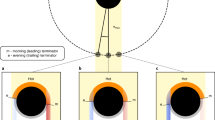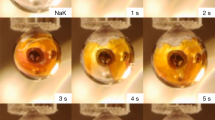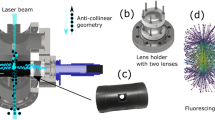Abstract
IN a previous letter (NATURE, June 9, 1928) I outlined the method by which estimates of ionisation potentials might be derived from the spectra of Cepheid variables. Many of the lines emitted by ionised atoms are intensified at or near maximum luminosity phase and diminish in intensity as the star passes through the phase of minimum light. Many arc lines, on the other hand, show the reverse tendency. By comparing the behaviour of certain ionised lines with spark lines due to titanium, scandium, strontium, and barium, the ionisation potentials of which are known, it has been possible to estimate this constant for iron, yttrium, and lanthanum (loc. cit.), and quite recently for vanadium. From the periodic changes in intensity of the ionised line λ4205.07 I have obtained for the ionisation potential of vanadium 6.74 volts, the final figure being extremely uncertain.
This is a preview of subscription content, access via your institution
Access options
Subscribe to this journal
Receive 51 print issues and online access
$199.00 per year
only $3.90 per issue
Buy this article
- Purchase on Springer Link
- Instant access to full article PDF
Prices may be subject to local taxes which are calculated during checkout
Similar content being viewed by others
Author information
Authors and Affiliations
Rights and permissions
About this article
Cite this article
DOUGLAS, A. Astrophysical Estimate of Ionisation Potential of Vanadium. Nature 123, 606–607 (1929). https://doi.org/10.1038/123606d0
Issue Date:
DOI: https://doi.org/10.1038/123606d0
Comments
By submitting a comment you agree to abide by our Terms and Community Guidelines. If you find something abusive or that does not comply with our terms or guidelines please flag it as inappropriate.



